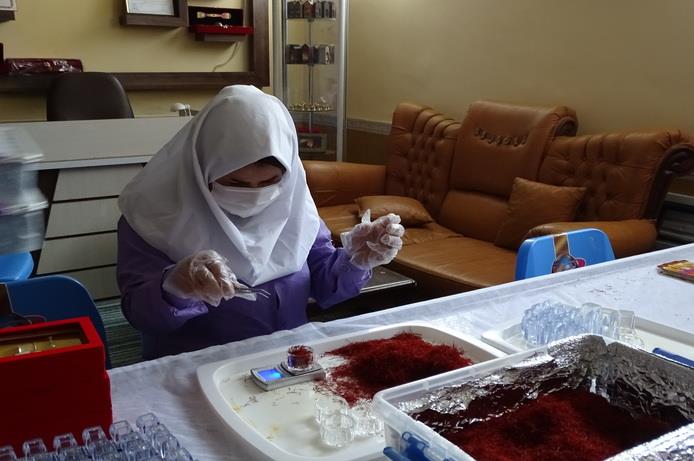
The trail-blazing female entrepreneur leading Afghanistan’s growing saffron market
Karima is opening doors for other Afghan women to enter the saffron industry
Karima’s saffron business is booming, with a little help from a FAO project. ©FAO/H.Azizi
07/10/2020
Saffron: one of the world’s most expensive spices, known for its fiery colour and delicate flavour. Not only is it a key ingredient in many dishes across the world, from Spanish paella to Iranian koresh, it is used in both medicine and perfumery too. Due to this versatility, global demand is high – but given that it is produced by hand, there is a hefty amount of labour required for its production, so getting this sought-after spice onto the market is no easy feat. However, for those that manage it, it is a profitable business.
Despite the challenges Afghan farmers have contended with in recent decades, ranging from conflict to natural disasters, the country’s saffron production industry is promising. The climate in Afghanistan is ideal for growing the spice and it has become one of the most important sources of income for small and medium-scale Afghan farmers and traders. In 2019, the production and export of saffron brought USD 27 million into the country, which is no surprise, given that Afghan saffron was recently ranked first in the world for quality.
Herat province is one of Afghanistan’s major areas for saffron production, and it is here that FAO runs its “Promoting the Value Chain - West (PVCW)” project funded by the United States Agency for International Development (USAID). The project works with local traders to build their capacity to produce, process and package saffron according to global quality and hygiene standards, equipping the producers with the necessary machinery and assisting them in getting ISO certificates to export abroad. One of the project’s key objectives, however, is to support women in starting their own businesses and taking advantage of the economic opportunities offered by the saffron trade.
Karima Sadiqi is the owner of a saffron production company in Herat province. As a woman in Afghanistan’s conservative society, it was not easy for Karima to get her family’s permission to begin her own business and earn her own money. Initially she began her work as a small-scale saffron producer working with middlemen to sell the products nationally and internationally. However, after three years of hard work, she gained her family’s support and she decided to take her business to the next level. She registered her business, Karwan Saffron and could then begin competing with other saffron production companies on the market.


Karima’s business handles every aspect of saffron production, from harvesting to exporting abroad. Left: ©FAO/A.Sadiqi Right: ©FAO/H.Azizi
A blossoming saffron business
At first it was hard for her to make her mark in such a male-dominated market, but things started looking up after she attended the 14-day FAO training course in Herat. With this training run by the PVCW programme, Karima learned how to write a good business plan and how to link her product with new markets through branding and marketing. She also learned more advanced saffron cultivation methods, including water management and the optimum spacing between saffron plants. With this new knowledge, she improved the branding, processing and production methods of her products.
Putting into practice the lessons she learned in the course, her business quickly took off. In 2018, she produced 28 kilograms of saffron from her family’s land, but in 2019, she managed to get 50 kilograms of saffron from the same land. She has also been able to improve the quality of saffron, which now sells for a higher price than it did before. Also through FAO’s facilitation, she was able to attend different national and international exhibitions that enabled her to establish global customers.
“I’m becoming more and more interested in this field because I believe that saffron is an important and high value crop not only in Afghanistan but also across the globe. Through the sale of this product, I can not only make money but show a positive face of Afghanistan to the world,” says Karima with a smile.
Her business is so successful that she now exports her saffron to Tajikistan, Uzbekistan, India, Ukraine and Australia, but she is planning to obtain more land in order to target more national and global customers.
“Compared to the current demand, the level of production is still very low, and I am seeking every opportunity to expand my production,” explains Karima.

A field of saffron ready to be harvested. ©Fresnel/shutterstock.com
Supporting women to improve their livelihoods and enhance their social status
Women have far fewer opportunities to work in Afghanistan, mainly due to cultural restrictions that limit women from working outside the home. Karima is fighting against this prejudice, currently employing 28 other women in her company. Despite the challenges she faces in the community as a female entrepreneur, she strongly believes that overcoming them can lead to greater opportunities for Afghan women in the country.
“I believe that nothing is impossible in this world. Everything is difficult before it is easy. However once we start, we can move forward very fast,” she said.
"I want to create more job opportunities for women, specifically for those who are the only bread winners in their families. On the one hand, this job helps them earn some income and enhance their livelihoods, and on the other hand, it improves their social status.”
Helping women like Karima take full advantage of opportunities in the food and agriculture sector is exactly why FAO runs programmes like this one in Herat province. Empowering women to fulfil their potential is crucial if we are to increase food security, improve gender equality and achieve all of the Sustainable Development Goals.
Related links
Learn more

